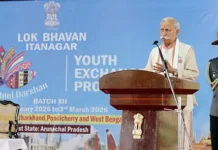[Nyatum Doke]
Our Arunachal is a land of opportunities, possibilities and dreams; but then it is also a land of difficulties, hardship and challenges. The opportunities bestowed by nature, by our traditions and culture; the possibilities that these opportunities provide to realise new dreams – the dream and aspiration of a ‘new Arunachal’, or a ‘rising/emerging Arunachal’ – a buzzword slowly gaining momentum. The question then is how to channel and realise the dreams; how and where to release the newfound zeal; how to rise.
Despite the first light falling on the mighty mountains, many of the pockets are still in the ‘shadow zones’ due to the wrong ‘positioning of the mighty mountains’ themselves. By ‘positioning’ I metaphorically mean the way we try to define the ‘process of development’ in terms of narratives that are not relevant to us. One famous line I hear is, “Hariyali scheme se de-hariyali hogya (Hariyali scheme for afforestation instead led to deforestation.).”
Take for instance the scenario of digital education in Arunachal Pradesh. During our childhood in the ’90s, we used to confront shortage of books and teachers. We survived. Today, with the dawn of civilisation and the era of the emerging technology, everything is turning digital. We are told that the ‘world is a village’ and boundaries are fading’, the leaves of ignorance shedding, and it is believed that everything is at the fingertip of an individual and within their own control. But, as I happen to travel a few miles away from the district headquarters towards some village, the mobile network, India starts to dwindle and flicker, thereby, the amorphous ghost of digital divide, shattering the dreams and aspirations of the youths and the people in the remote areas.
Today, in Arunachal, apparently we have moved from computer aided learning to smart classes to digital classrooms; however, my cook, who is from a remote village in Longding, would lament and tell me that “online classes are going on, and I cannot afford a smartphone for my child.” Then I see students perplexed and worried about their online exams. So, what is going wrong?
Let’s see. Suppose we place our state on the five criteria or stages prepared by WW Rostow, ie, (1) Traditional stage based on lack of technology, and intensive agriculture; (2) Transitional stage based on some technological advancement; (3) Take-off stage when structural constrains are removed and self-sufficiency is attained; (4) Drive to maturity stage when industrialisation has started and technology development and productivity has risen; then finally the fifth stage: the mass consumption stage, after people have all the basic needs. Here, we can observe that our state can be placed somewhere between the first three stages, but unfortunately, we trying to get into the fifth stage directly. What is needed is to address the structural and other issues in the previous stages at first.
Coming back to the example of adopting digitalisation in various spheres, first, we should ensure access to good internet, enable people and employees to use the sophisticated technology, in addition to giving affordable and high-end tools and gadgets (smartphones and computers). For example, we provide a CMAAY health card, but I have seen many not knowing how to use it, which defeats the very purpose. The examples can go on.
So, awareness, accessibility, availability, affordability, and most importantly, capability must be ensured if any programme or scheme has to be made effective in the real sense. This I am sure would be ubiquitously applicable to any efforts by the policy framers towards a ‘new Arunachal’.
My point is simple: our state need not copy-paste, replicate or reproduce or imitate the things which are being done by other states. We should not put the cart before the bull; first create or lay the base, and then the foundations on it. Provide the necessary infrastructure, then come out with planning and implementing things.
Our Arunachal Pradesh in essence is intrinsically and instrumentally different from other fellow states of the country. We need to formulate customised and tailor-made policies and programmes to fit the specific needs of our state, instead of adopting anything readymade. Then it should be evaluated based on qualitative outcomes and not on quantitative output. (The writer is DIPRO, Longding. This is the first part of the article.)

